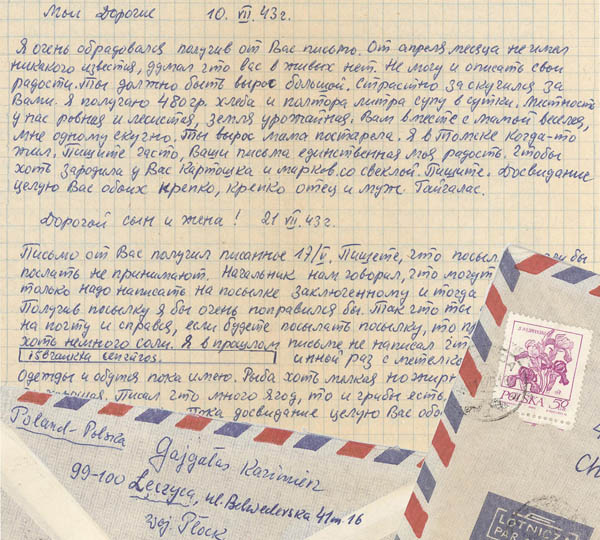Family separated in two prison camps
Posted on June 26, 2011
This is a most unusual two page letter, written in Russian. It appears to be a transcription of letters written by Kazimieras Gaigalas to his wife and son. He is in the Riesoty gulag prison camp, near Krasnoyarsk, writing to his family who is in another Siberian location, near Tomsk. The distance separating them is about 300 miles. There are a total of 8 transcribed letters dating from October 21, 1942 to July 21, 1943.
It appears that his wife saved the letters he had sent, and that they were eventually taken to Poland, where they were transcribed by his son. The letters were written in Russian, as was required at the time, and were heavily censored.
In these letters he mentions the deaths of 8 people who were acquaintances of the family. He was informed that his prison term is for 5 years, ending on July 14, 1946.
He writes that he is tired and weak, and his weight is 60 kg (130 lbs). He receives 480 gm (1 lb) of bread per day along with 1.5 liters of soup. He repeatedly requests that his wife send him dried potatoes, dried fish, flour and salt. However, there is no mention that he ever received any such package.
A portion of one letter was censored (all mail going into and out of the Soviet Union, especially Siberian prison camp locations, was read and censored). He started explaining what he was assigned to do, and the rest of the explanation was censored. In the uncensored subsequent sentence he mentions that on occasion he sweeps the yard.
“When you receive this letter, please write to me. The only joy in my life is receiving your letters. Dear and loving son and wife, do not forget me, write more frequently.”
“I frequently see you in my dreams. I wake up and you are gone. It was only a dream, not reality.”
“Son, it is more joyful being with your mother. But for me, alone, there is only sadness. You have grown up. Your mother has gotten older. Write more frequently. Your letters are the only joy in my life.”
Kazimieras Gaigalas was 60 years old when he was deported. Before World War I, for 12 years he worked on the Siberian railroad. During the war, he worked for a relief agency providing assistance to Russians who were injured or suffering. Shortly after the war, he was the local alderman, and then resumed working as a farmer.
The last letter that he wrote was on July 21, 1943. He died three months later, on October 13, 1943.
This letter is on display in the Hope and Spirit exhibit which I have organized at the Balzekas Museum of Lithuanian Culture, 6500 S. Pulaski Rd., Chicago, Illinois.
The translation of this letter was kindly provided by Ms. Danguole Pociute.



